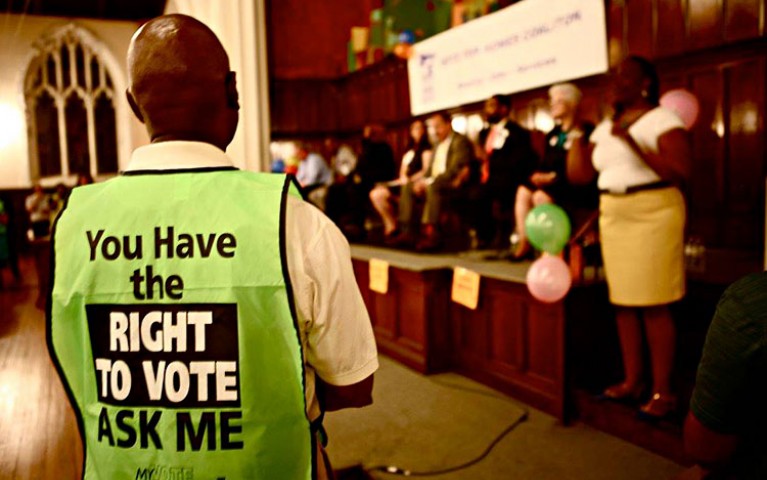Voting For Justice

In 1999, the city of Philadelphia faced a mayoral election. Throughout the eight-year tenure of then-outgoing mayor Ed Rendell, homelessness was a critical issue for the city, with many struggles but also signs of hope.
Realizing that we were at a watershed, Project HOME called together allies and partner organizationsin an ad hoc coalition we called “Election ’99: Leadership To End Homelessness.” The coalition reached out to both candidates and voters, stressing the issues critical to persons experiencing or at risk of homelessness. As a result, the eventual victor, incoming Mayor John Street, formed a special transition team to develop policies on homelessness—the first of its kind. Ensuing partnerships between city government, homeless advocates, nonprofits, and businesses to address homelessness were groundbreaking, and helped make Philadelphia a national model.
That first election-year coalition morphed into Vote For Homes, a voter-education, registration, and mobilization coalition spearheaded by ProjectHOME. In the last 15 years, Vote For Homes has registered more than 16,000 people, produced guides for voters, hosted candidate forums, and consulted with candidates on policies. Every election day, it empowers people to express their voice at the polls, and it highlights the plans each leader has to address poverty and housing.
Project HOME’s Director of Advocacy and Public Policy Jennine Miller, who has coordinated Vote For Homes since its inception, comments: “Over the years, the Vote For Homes coalition has realizedthat we must emphasize personal conversation with neighbors and affordable-housing residents to get people to the polls. We use our relational skills to strategically re-engage voters. Volunteers are the critical link to call voters and knock on doors.”
In a city where voter turnout can be low, re-engaging the populace in elections is essential. The reality is this: Political discourse around issues of poverty and homelessness creates a citizenry and a city which believes these problems can be solved. When we are able to bring our best experience to propose concrete and realistic policies to solve homelessness, our collaborations bear rich fruit. Most fundamentally, Project HOME has learned from its own experience. Just as our most effective work hinges on the creation of a broad, diverse community, we realize that our strongest government hinges on the participation of all its citizens, including those on the margins. Often our poorest citizens are those least experienced in raising their political voices, but any healthy political discourse demands the inclusion of such voices.
Ericka Brown, a Rowan Homes resident active in Project HOME’s Advocacy Committee, reflects on her own shift: “Although I have always been an advocate for my family, I was not a citizen advocate. I find this group a powerful vehicle for information as well as how to get people involved. In my community, people do not understand the power of their vote or believe that voting makes a difference. I have begun to see the power people carry to change things.”
Heather Bargeron, a staff member and an organizer with Vote for Homes, comments, “There are many pervasive myths about barriers to voting for people in our community. I love being able to dispel those myths—and to then watch volunteers spread the good news to their friends and neighbors that their vote matters.” Given that the coming months hold the visit of Pope Francis to our city, as well as the presidential election in 2016, this is an especially significant electoral season for the direction of public policy. Like 15 years ago, we are at a new point in the struggle; a special time when we can make real progress in making our city more just and compassionate.